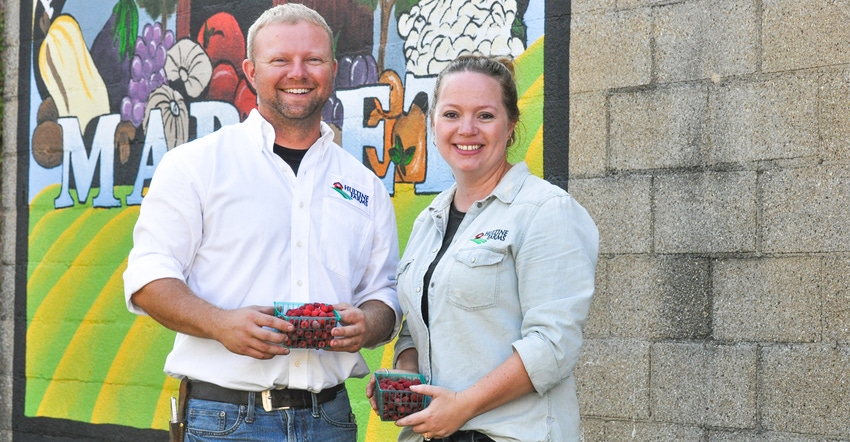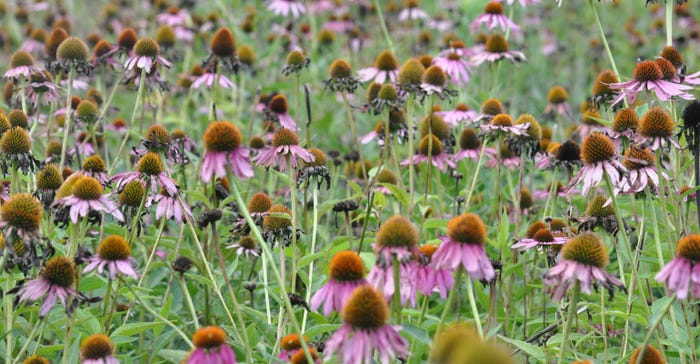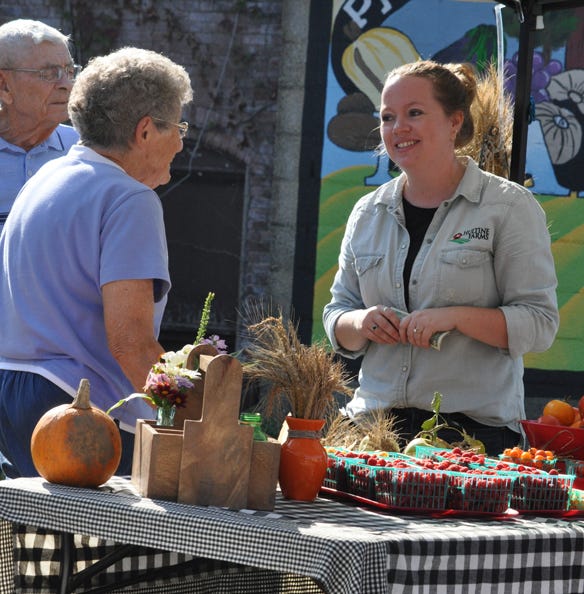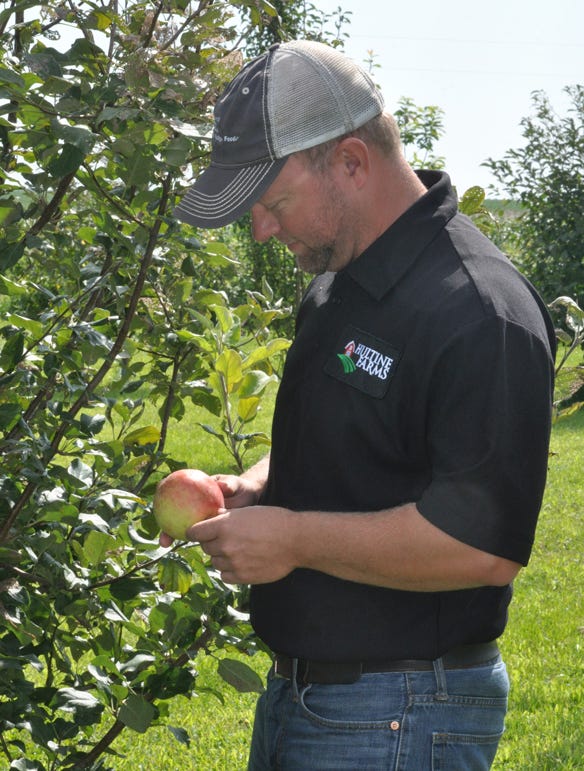
It’s a beautiful thing when the stars align and a farm family’s vision falls into place. For the Hultine siblings, a passion for horticulture, new culinary skills and a simple question ignited a fruit and vegetable business on their Princeton, Ill., farm.
Nathan Johanning, University of Illinois Extension educator, says diversifying with specialty crops is a way for young farmers to return to the farm when the size of the operation may not be able to support additional family members. “People want to come back to the farm and be their own boss and farm,” he says. “They know grain farming, but there are only so many acres, and Dad may not be ready to retire.”
Fourth-generation farmer and youngest sibling Evan Hultine returned to his family’s Princeton-based corn and soybean operation after graduating from the University of Illinois in 2009. During his college years, his sister, Sarah Hultine Massengale, asked if he’d ever considered raising fruits and vegetables to sell at farmers markets or through a Community-Supported Agriculture program. Sarah works as a community development specialist for the University of Missouri Extension and sees how local food systems play an important role in rural communities.
“Consumers in rural areas really value that connection with farmers; they want to support local farmers,” she says. “For smaller hobby farms or for young farmers returning to the farm, farmers markets are a great place for people to start selling.” Participation costs are reasonable, and there are no bricks and mortar to worry about, she adds.
According to Craig Chase, value-added and local foods director with Iowa State University Extension, many new specialty crop farmers start with a CSA, where farmers produce 30 to 40 products and distribute them to customers weekly in share boxes. Customers pay a fee to join the CSA and cover the production costs — around $350 per share for a 20-week session. The farmer nets roughly 25% to 35%.
Sarah’s question sparked her brother’s interest. After one horticulture class, Evan found his calling and switched his major. “I fell in love with it,” he notes.
Meanwhile, Sarah and Evan’s sister, Ellen Hultine Day, unearthed a knack for cooking while she and her husband were living in France. You won’t find bottled dressings, cake mixes or canned pumpkin in French grocery stores, Ellen explains, so she taught herself how to make vinaigrette, pies and more from scratch. “Not to brag, but I’m pretty good at it,” she says, as she holds a jar of her fresh jam.
With Evan’s green thumb, Ellen’s talent with fresh ingredients and Sarah’s expertise, Hultine Farms branched out into specialty crops six years ago.
A family affair
Today, the specialty crops at Hultine Farms are considered Ellen and Evan’s business, and they make up a small but growing percentage of the farm’s total income. On roughly 3.5 acres, they produce fresh raspberries, including their trademark golden raspberries; sweet corn; peppers; tomatoes; green beans; dragon tongue beans; summer squash and pumpkins for the Princeton Farmers Market. They sought out unique products like the dragon tongue beans and golden raspberries to drive traffic to their booth.
 POLLINATION PARTY: The Hultines installed a pollinator habitat across the lane from their raspberry bushes and apple, pear and cherry trees.
POLLINATION PARTY: The Hultines installed a pollinator habitat across the lane from their raspberry bushes and apple, pear and cherry trees.

Evan gained experience with fruit trees by helping with the horticulture block redesign at U of I. The Hultines develop an annual crop plan based on research such as enterprise budgets, past sales, padding in case of weather or pest loss, and “enough to fill our fridges,” Evan explains.
Ellen commutes to the farm once or twice a week from Dunlap, where she works and lives with her husband, Jeff. Evan works the specialty crops whenever he’s not doing custom work, such as stomping male rows in seed production fields, or helping his dad, Lynn, manage the corn and soybean operation. Sarah and husband David and their children offer “moral support” from Missouri and lend a hand when they visit the farm, especially when it’s time to pick pumpkins.
Friday is prep day for Ellen and her mom, Kathy, a retired teacher, as they spend hours picking, sorting and packaging fresh goods for the Princeton Farmers Market, held on Saturday.

RIGHT TO THE SOURCE: Ellen Hultine Day, Hultine Farms, fields questions from customers, ranging from how they grow their fruits and vegetables to how to cook them.

Chase says labor is often underestimated by new specialty crop producers and, logistically, one person can manage roughly 2 acres.
“Fruits and vegetables require so much more tender care, week in and week out,” Evan says. “Not that corn and beans are easy, but we don’t have as many production options for fruits and vegetables.”
Today, the Hultines plant, weed, harvest and package by hand. What about pest control? Preharvest intervals take pesticides off the table for several crops, like raspberries and fruit trees. For pesky Japanese beetles, Ellen and Kathy shake the branches until the beetles fall into a bucket of soapy water.
“It takes a few hours, but it’s that or lose the crop,” Evan says, adding that not all the crops require that manpower.
To limit disease pressure that can spread through irrigation — especially in the pumpkin patch, where powdery mildew may linger — they water the soil at the base of the plants instead of over the top.
What’s next for Hultine Farms?
The Hultines’ apple, cherry and pear trees are slowly coming around and almost producing enough product to sell. “The tough part is you plant fruit trees and you wait for a long time,” Evan says. “Perennial crops require a big cost upfront. It’s more like buying a car or college education. You’re making that investment to pay it off down the road.”
The Hultines hope to expand their orchard, including additional hand labor and special equipment such as orchard sprayers for fungicide and insecticide applications. Evan, the self-proclaimed “math guy,” says they’re considering a greenhouse for year-round production opportunities.

WORTH THE WAIT: “The tough part is you plant fruit trees and you wait for a long time,” Evan Hultine says. “Perennial crops require a big cost upfront. It’s more like buying a car or college education. You’re making that investment to pay it off down the road.”

Ellen plans to renew her food license and begin selling produced goods, like her golden raspberry jam, and is considering offering cooking classes to share her French-inspired culinary skills.
For now, the Princeton Farmers Market keeps the siblings busy, and they provide products for special events, like fresh raspberries for the Knox and Henry County Farm Bureau Farm to Fork dinners. They sell to their local food pantry, which receives grants to source farm-fresh products. Princeton’s coffee shop, The Flour House, uses Hultine raspberries in baked treats when they are in season.
No matter which direction the future takes them, Evan and Ellen’s enthusiasm for what’s to come is contagious. Evan views their specialty business as an “experiment to find new opportunities.”
“We are all excited about growing this and finding a spot for everyone on the farm. That’s kind of the Norman Rockwell dream, right?” Evan says. “There’s definitely a way for our family to include all of our talents and turn it into something cool.”
Watch the website tomorrow for more about producing specialty crops.
About the Author(s)
You May Also Like




